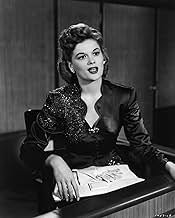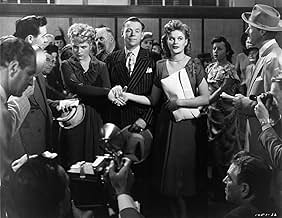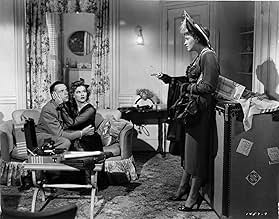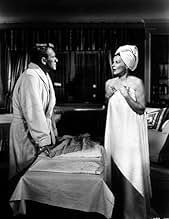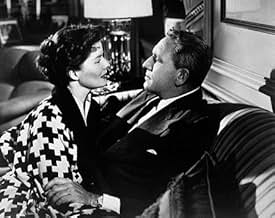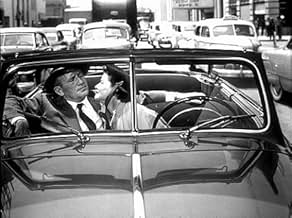VALUTAZIONE IMDb
7,4/10
23.881
LA TUA VALUTAZIONE
Aggiungi una trama nella tua linguaDomestic and professional tensions mount when a husband and wife work as opposing lawyers in a case involving a woman who shot her husband.Domestic and professional tensions mount when a husband and wife work as opposing lawyers in a case involving a woman who shot her husband.Domestic and professional tensions mount when a husband and wife work as opposing lawyers in a case involving a woman who shot her husband.
- Regia
- Sceneggiatura
- Star
- Candidato a 1 Oscar
- 3 vittorie e 5 candidature totali
Edward Andrews
- Kip's neighbor
- (non citato nei titoli originali)
Bonnie Bannon
- Woman in Courtroom
- (non citato nei titoli originali)
Charles Bastin
- Young District Attorney
- (non citato nei titoli originali)
Harry Baum
- Commuter
- (non citato nei titoli originali)
Joseph E. Bernard
- Mr. Bonner - Adam's Father
- (non citato nei titoli originali)
Recensioni in evidenza
Lawyers Spencer Tracy (Adam) and Katharine Hepburn (Amanda) spend the film on opposite sides during the trial of Judy Holliday (Mrs Attinger) who is up on a charge of attempted murder after she shoots her husband Tom Ewell (Mr Attinger). Given that the film is a comedy, it can only really end one way for Judy Holliday.
Tracy and Hepburn undoubtedly work well together but the film has occasions where these two characters talk across each other and it just seems too shouty. It may be realistic but it certainly is not entertaining. Hepburn tends to over-exaggerate and lay on the dramatics when she acts and Spencer Tracy is clearly the better actor of the two. Actually, the best character is that played by Tom Ewell. He steals the film in all his scenes because he is genuinely funny. Judy Holliday is good if you can get past her terrible voice but musician neighbour David Wayne (Kip) is awful – not in the fact that he is meant to be an annoying character, but in the fact that he doesn't know how to convincingly portray a realistic person. He plays it gay one minute, then straight another minute, he's rubbish at acting. Nothing about his character rings true.
At the heart of the film is Hepburn's ridiculous notion about women's lib and some sort of feminist ideals – you know, the sort of thing that makes women annoying. Face the facts Hepburn, Judy Holliday had just tried to kill someone for goodness sake – it's got nothing to do with gender!
It's certainly a watchable film with some amusing parts (mainly with Tom Ewell), and some annoying parts (Katharine Hepburn and every appearance of David Wayne), and overall, it's more annoying than funny. Certainly not a classic as people seem to believe because they are told that it is. Everyone has done better.
Tracy and Hepburn undoubtedly work well together but the film has occasions where these two characters talk across each other and it just seems too shouty. It may be realistic but it certainly is not entertaining. Hepburn tends to over-exaggerate and lay on the dramatics when she acts and Spencer Tracy is clearly the better actor of the two. Actually, the best character is that played by Tom Ewell. He steals the film in all his scenes because he is genuinely funny. Judy Holliday is good if you can get past her terrible voice but musician neighbour David Wayne (Kip) is awful – not in the fact that he is meant to be an annoying character, but in the fact that he doesn't know how to convincingly portray a realistic person. He plays it gay one minute, then straight another minute, he's rubbish at acting. Nothing about his character rings true.
At the heart of the film is Hepburn's ridiculous notion about women's lib and some sort of feminist ideals – you know, the sort of thing that makes women annoying. Face the facts Hepburn, Judy Holliday had just tried to kill someone for goodness sake – it's got nothing to do with gender!
It's certainly a watchable film with some amusing parts (mainly with Tom Ewell), and some annoying parts (Katharine Hepburn and every appearance of David Wayne), and overall, it's more annoying than funny. Certainly not a classic as people seem to believe because they are told that it is. Everyone has done better.
Not as dramatic, engaging or funny as has been suggested but the lead pair make it well worth seeing
Adam and Amanda Bonner are happily married, despite the sparky nature of their relationship. Lawyers each, both are interested in a newspaper report of a woman who shot (but not killed) her husband when she discovered him in the arms of another woman. The Bonner's take differing views of the case and it is no surprise that Adam ends up prosecuting while Amanda is Doris Attinger's defence counsel. With the gloves off in the courtroom with a legal battle of sexual equality, it is no surprise that the conflict and disagreements don't end at the front door and soon it is all kicking off.
The issue of sexual equality may have moved on from where it was in the middle of the last century but this film occasionally hits an interesting point, even if the majority of it is fairly shallow and a bit unconvincing in terms of legal argument. Without really engaging me, the film still held my interest as the story developed and it was fairly enjoyable even if it couldn't settle on whether or not it is a comedy or a courtroom "issue" drama; as it was I didn't think it did either brilliantly but did both well enough to make it work. I did expect more laughs because I thought it was going to be one of the screwball genre, but once I realised that it was more amusing than funny then I was able to settle into it.
One of the main reasons that the film has continued to last down the years is the chemistry between Tracy and Hepburn. Both are convincing as a couple in terms of romance, attrition, chemistry and other aspects of their relationship on screen. Tracy is tetchy and enjoyable but Hepburn is more than a match for him and she does it with style and real humour. Support is good from Holliday as well as Wayne's annoying neighbour. Mainly though it is Tracy and Hepburn's movie and they more than carry it between them.
Overall though this is not quite the classic that I had hoped it would be but it still did enough to make it work today. The courtroom stuff is not as dramatic or as relevant as it may have once been and the comedy is more of the sharp variety than the laugh-out-loud sort; however the chemistry between the lead two keeps it going and makes it worth seeing still.
The issue of sexual equality may have moved on from where it was in the middle of the last century but this film occasionally hits an interesting point, even if the majority of it is fairly shallow and a bit unconvincing in terms of legal argument. Without really engaging me, the film still held my interest as the story developed and it was fairly enjoyable even if it couldn't settle on whether or not it is a comedy or a courtroom "issue" drama; as it was I didn't think it did either brilliantly but did both well enough to make it work. I did expect more laughs because I thought it was going to be one of the screwball genre, but once I realised that it was more amusing than funny then I was able to settle into it.
One of the main reasons that the film has continued to last down the years is the chemistry between Tracy and Hepburn. Both are convincing as a couple in terms of romance, attrition, chemistry and other aspects of their relationship on screen. Tracy is tetchy and enjoyable but Hepburn is more than a match for him and she does it with style and real humour. Support is good from Holliday as well as Wayne's annoying neighbour. Mainly though it is Tracy and Hepburn's movie and they more than carry it between them.
Overall though this is not quite the classic that I had hoped it would be but it still did enough to make it work today. The courtroom stuff is not as dramatic or as relevant as it may have once been and the comedy is more of the sharp variety than the laugh-out-loud sort; however the chemistry between the lead two keeps it going and makes it worth seeing still.
Adam's Rib turned out to be a delightfully cheeky romp with a kicker sense of humour, all acted out with ease by Spencer Tracy & Katherine Hepburn. I love how the film veers from the courtroom right into their marital home and becomes not just about a battle of wills, but a battle of the sexes as well, much fun watching this famous couple go at each other, both at work and at home. The film benefits greatly from the appearance of the lovely Judy Holliday in her breakthrough role, and it amused me greatly to see David Wayne playing a shifty character as I remember him fondly from the Twilight Zone episode Escape Clause in 1959. 8/10
Of the nine films which paired Spencer Tracy and Katherine Hepburn, Adam's Rib is often considered the best. Writers Ruth Gordon and Garson Kanin were friends of the famous couple and wrote the film specifically for them. Kate insisted the film be directed by her favorite screen director, George Cukor, who services the brilliant writing and on-screen chemistry with his trademark elegant staging and unobtrusive style. The result is a comedy that remains the best "battle of the sexes" films ever made.
When Doris Attinger (Judy Holliday) discovers her husband in the arms of another woman, she opens fire and is charged with attempted murder. Enter Adam and Amanda Bonner (Tracy and Hepburn), married lawyers whose lives are turned upside down when Adam is assigned to the prosecution. An ardent proponent of women's rights, Amanda decides to represent Doris, claiming that if the sex of the parties on trial were switched, the jury would feel differently. This conflict of interests creates friction in the courtroom as well as the Bonners' home.
Spencer Tracy, with his confident and relaxed screen presence, paints Adam as a man quite comfortable with his wife's force and ambition. But Adam grows upset with Amanda as the media spotlight finds the case and magnifies it into a cause for women's rights. He accuses Amanda with disregard for the law, reminding her that no one, man or woman, has the right to take the law into their own hands, and that Amanda is using the case for her own selfish purposes. The script is careful not to polarize Adam's interests. He reveres the law and has no special affection for Doris' husband. In opposing him, Katherine Hepburn manages to retain her signature strength while also portraying Amanda as a loving wife who fears the damage her marriage may sustain because of the case and its publicity. Amanda alleges that Doris is doomed to an unfair trial because the general public irrationally feels male infidelity is much more permissible than female infidelity.
The courtroom becomes a spectacle when Amanda puts a circus strong-woman on the stand and asks her to lift Adam. Tracy rises to the occasion, with an angry outburst that is empowered by his otherwise calm and restrained performance. Despite their marital bliss before the case, Adam admits that he likes "two sexes" and doesn't care for having a wife who is a "new woman" and a "competitor". This rare outpouring causes Amanda to realize just how personally Adam is taking the trial, and that it could result in their divorce.
Ruth Gordon and Garson Kanin deserve special recognition for creating a balanced on-screen battle in what has always been a controversial debate - gender equality. Amanda's plight is shaded by her experiences as a woman, and Adam is presented as a man who admits to always trying to hear her side of the story. That their marriage was a happy one before the trial is an indication of the equality they had achieved together. Amanda is, in fact, equal to Adam in both the career and financial worlds. To create a sparring partner for Amanda, Gordon and Kanin could easily have presented a misogynist, or even a lovable but cantankerous traditionalist. They were wiser to portray Adam as a man who simply refused to see the case as one for gender equality, but for vigilantism.
As directed by George Cukor, Adam's Rib features a great many long takes that play uninterrupted. Even during moments of action, like the scene in which both Bonners are getting dressed for dinner, Cukor utilizes minimal staging and camera movement. The camera points directly across the Bonners' bedroom, with her dressing room off frame left and his off frame right. They shout at each other, poking their heads into the frame, occasionally walking through the frame and back again. And later, when Adam discovers Kip and Amanda together, the ensuing fight is framed similarly, with the camera looking down the apartment hallway, characters popping into frame from the left or right and back again. This isn't to say Cukor doesn't move his camera much. There are several decisive camera movements, but Cukor's sparing use of them, and his tendency to rely more on well-composed master angles gives the film an elegant, traditional Hollywood style. The film also benefits from a lively score by Mikos Rozsa and a catchy Cole Porter tune, "Farewell Amanda". Jean Hagen, unforgettable for her comic turn in Singin' in the Rain, again demonstrates her talent for comedy as the "other woman".
Cukor must have realized that with Tracy and Hepburn on screen, all the camera really had to do was follow them, frame them, and let the sparks fly.
The screenplay and the actors' off-screen romance are gifts to the film. We feel for both of them, and believe in what both are trying to achieve. It is rare that a film about difference and equality plays so fairly to all parties involved, and also rare that such a sensitive subject can retain its comic appeal. But for all the film says about equality, Adam's Rib ultimately serves to remind us that when it comes to Hepburn and Tracy, there is no equal. - Scott Schirmer
When Doris Attinger (Judy Holliday) discovers her husband in the arms of another woman, she opens fire and is charged with attempted murder. Enter Adam and Amanda Bonner (Tracy and Hepburn), married lawyers whose lives are turned upside down when Adam is assigned to the prosecution. An ardent proponent of women's rights, Amanda decides to represent Doris, claiming that if the sex of the parties on trial were switched, the jury would feel differently. This conflict of interests creates friction in the courtroom as well as the Bonners' home.
Spencer Tracy, with his confident and relaxed screen presence, paints Adam as a man quite comfortable with his wife's force and ambition. But Adam grows upset with Amanda as the media spotlight finds the case and magnifies it into a cause for women's rights. He accuses Amanda with disregard for the law, reminding her that no one, man or woman, has the right to take the law into their own hands, and that Amanda is using the case for her own selfish purposes. The script is careful not to polarize Adam's interests. He reveres the law and has no special affection for Doris' husband. In opposing him, Katherine Hepburn manages to retain her signature strength while also portraying Amanda as a loving wife who fears the damage her marriage may sustain because of the case and its publicity. Amanda alleges that Doris is doomed to an unfair trial because the general public irrationally feels male infidelity is much more permissible than female infidelity.
The courtroom becomes a spectacle when Amanda puts a circus strong-woman on the stand and asks her to lift Adam. Tracy rises to the occasion, with an angry outburst that is empowered by his otherwise calm and restrained performance. Despite their marital bliss before the case, Adam admits that he likes "two sexes" and doesn't care for having a wife who is a "new woman" and a "competitor". This rare outpouring causes Amanda to realize just how personally Adam is taking the trial, and that it could result in their divorce.
Ruth Gordon and Garson Kanin deserve special recognition for creating a balanced on-screen battle in what has always been a controversial debate - gender equality. Amanda's plight is shaded by her experiences as a woman, and Adam is presented as a man who admits to always trying to hear her side of the story. That their marriage was a happy one before the trial is an indication of the equality they had achieved together. Amanda is, in fact, equal to Adam in both the career and financial worlds. To create a sparring partner for Amanda, Gordon and Kanin could easily have presented a misogynist, or even a lovable but cantankerous traditionalist. They were wiser to portray Adam as a man who simply refused to see the case as one for gender equality, but for vigilantism.
As directed by George Cukor, Adam's Rib features a great many long takes that play uninterrupted. Even during moments of action, like the scene in which both Bonners are getting dressed for dinner, Cukor utilizes minimal staging and camera movement. The camera points directly across the Bonners' bedroom, with her dressing room off frame left and his off frame right. They shout at each other, poking their heads into the frame, occasionally walking through the frame and back again. And later, when Adam discovers Kip and Amanda together, the ensuing fight is framed similarly, with the camera looking down the apartment hallway, characters popping into frame from the left or right and back again. This isn't to say Cukor doesn't move his camera much. There are several decisive camera movements, but Cukor's sparing use of them, and his tendency to rely more on well-composed master angles gives the film an elegant, traditional Hollywood style. The film also benefits from a lively score by Mikos Rozsa and a catchy Cole Porter tune, "Farewell Amanda". Jean Hagen, unforgettable for her comic turn in Singin' in the Rain, again demonstrates her talent for comedy as the "other woman".
Cukor must have realized that with Tracy and Hepburn on screen, all the camera really had to do was follow them, frame them, and let the sparks fly.
The screenplay and the actors' off-screen romance are gifts to the film. We feel for both of them, and believe in what both are trying to achieve. It is rare that a film about difference and equality plays so fairly to all parties involved, and also rare that such a sensitive subject can retain its comic appeal. But for all the film says about equality, Adam's Rib ultimately serves to remind us that when it comes to Hepburn and Tracy, there is no equal. - Scott Schirmer
Sometimes in life, we experience the most embarrassing situations. But no matter how embarrassing these situations are, they can't possibly be as whacked-out as what the characters in "Adam's Rib" experience.
It all begins when Doris Attinger (Judy Holliday) shoots her husband Warren (Tom Ewell) after she finds him cheating on her. She is promptly arrested for attempted murder. High-priced lawyer Adam Bonner (Spencer Tracy) is assigned to represent Warren in court. However, Adam's wife Amanda (Katharine Hepburn) finds it despicable that a woman was arrested for punishing her unfaithful husband, and decides to represent Doris in court.
Well, as you can imagine, with husband and wife on opposite sides of the trial, things get a little crazy. It only makes sense that they can't help but maintain their spousal attitudes towards each other while in court (especially under the table). But even Amanda starts to find Adam unpleasant for defending Warren, and she plays a few tricks on him in court, namely with a very muscular woman.
One thing that you have to wonder after seeing a movie this good is: how did Ruth Gordon and Garson Kanin come up with such a great story? Well, the point is that they did. It focuses not only on sexism, but also on how the whole trial is affecting their marriage.
Anyway, the point is that in my opinion, "Adam's Rib" should have won Best Picture for 1949. Perfect.
It all begins when Doris Attinger (Judy Holliday) shoots her husband Warren (Tom Ewell) after she finds him cheating on her. She is promptly arrested for attempted murder. High-priced lawyer Adam Bonner (Spencer Tracy) is assigned to represent Warren in court. However, Adam's wife Amanda (Katharine Hepburn) finds it despicable that a woman was arrested for punishing her unfaithful husband, and decides to represent Doris in court.
Well, as you can imagine, with husband and wife on opposite sides of the trial, things get a little crazy. It only makes sense that they can't help but maintain their spousal attitudes towards each other while in court (especially under the table). But even Amanda starts to find Adam unpleasant for defending Warren, and she plays a few tricks on him in court, namely with a very muscular woman.
One thing that you have to wonder after seeing a movie this good is: how did Ruth Gordon and Garson Kanin come up with such a great story? Well, the point is that they did. It focuses not only on sexism, but also on how the whole trial is affecting their marriage.
Anyway, the point is that in my opinion, "Adam's Rib" should have won Best Picture for 1949. Perfect.
Lo sapevi?
- QuizInspired by the real-life story of husband-and-wife lawyers William Dwight Whitney and Dorothy Whitney, who represented Raymond Massey and his ex-wife Adrianne Allen in their divorce. After the Massey divorce was over, the Whitneys divorced each other and married the respective Masseys.
- BlooperDuring the trial proceedings, a Black juror was in the first row, but the trial scene following the argument between Amanda and Adam where Adam walks out of the home, the jury makeup has now changed and the Black juror is not present. However the following day when court resumes for the jury verdict, the Black juror is back in the jury box.
- Curiosità sui creditiOpening credits are little curtains that go up and down, on a stage in a performance hall.
- Versioni alternativeAlso available in a computer colorized version.
- ConnessioniEdited into Hollywood: The Dream Factory (1972)
- Colonne sonoreFarewell, Amanda
(1949)
Music and Lyrics by Cole Porter
Played during the opening credits and often in the score
Sung by David Wayne (uncredited), accompanying himself on the piano
Reprised by the voice of Frank Sinatra (uncredited) on the radio
Whistled by Katharine Hepburn (uncredited)
Sung a cappella by Spencer Tracy (uncredited)
I più visti
Accedi per valutare e creare un elenco di titoli salvati per ottenere consigli personalizzati
- How long is Adam's Rib?Powered by Alexa
- If Kip is gay, why is he always chasing after Amanda ? Adam and Amanda insinuate that Kip "doesn't have far to go" to be a woman, but there he is, funneling champagne down Amanda's throat !
Dettagli
- Tempo di esecuzione1 ora 41 minuti
- Colore
- Proporzioni
- 1.37 : 1
Contribuisci a questa pagina
Suggerisci una modifica o aggiungi i contenuti mancanti

Divario superiore
By what name was La costola di Adamo (1949) officially released in India in English?
Rispondi


